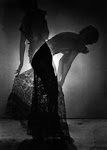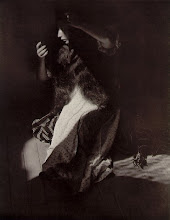James Blackshaw - Litany of Echoes (Tompkins Square 2008)

JAMES BLACKSHAW
Litany of Echoes
Tompkins Square 2008
4/5
Listen: The Past Has Not Passed
Prolific guitarist, James Blackshaw returns with his sixth album in four years and shows no signs of running out of ideas any time soon. Playing twelve-string guitar, (though he does play piano on the opening and closing tracks) Blackshaw is joined this time by Fran Bury, who adds a violin and viola to the mix. Blackshaw uses his own tunings, but this isn’t dry intellectualism – far, far from it – this is one of the most emotionally engaging albums of the year. The melodies on Litany of Echoes are so deep and rich that as the songs progress, any sense that Blackshaw is playing guitar disappears and the notes drip hypnotically into one another to create a beautiful tapestry of sound. A previous note will continue to ring out as Blackshaw deftly moves onto the next, leaving no space at all between the notes, just layers of harmony.
There is something intuitive about Blackshaw’s ability to move from sparser passages to dense walls of sound. On ‘Echo and Abyss’ – here the title reinforces the sense of what Blackshaw is playing – he begins with a simple melody on guitar, which rings out for long time, creating the echo and then over time mutates, develops, expands and draws the listener into the abyss, which is probably darker than anything than Blackshaw’s done before, yet this is at the other end of the spectrum from the dark, noisy, drone meditations of Keiji Haino.
Though, there is a definite droning quality about it - Bury’s violin on ‘Past Has Not Passed’ practically disappears in a forest of beautiful harmonies. With his playing, Blackshaw achieves a sort of portamenti effect (loose sliding between pitches) and the result is no less than captivating as he gently manipulates melodies to create subtle nuances, which constantly develop throughout the piece.
This sort of style, with such restraints puts Litany of Echoes more in line with the minimalism of Steve Reich and Philip Glass than the folk of Jack Rose and John Fahey. The whole thing is far more restrained than last years Cloud of Unknowing, but within those self-imposed limits, Blackshaw pretty much achieves all that anyone possibly could achieve.
As always with Blackshaw the title is well chosen – using the word litany to underlie the spiritual significance of the album in the same way as last years Cloud of Unknowing. It is certainly meditative and there is a definite feeling of ascension – but Blackshaw likes to keep his titles ambiguous, allowing for far wider interpretation. ‘Gate of Horn’ and ‘Gate of Ivory’ (Blackshaw’s piano pieces, which to give you some idea of the minimalism are just five notes repeated in a pattern) – refer to the gates through which good and bad dreams pass respectively. You could go on and on, I guess about various interpretations, but the fact that the album allows for such imaginative reading is for me an excellent thing in itself. Sure it can pass the time in the background, but for those that really listen, you’ll be richly rewarded. Litany of Echoes is a sign that the guitarist is maturing, his guitar playing has the same faultless, ethereal touch, but as a composer Litany of Echoes surpasses anything he has done in the past.



0 comments:
Post a Comment